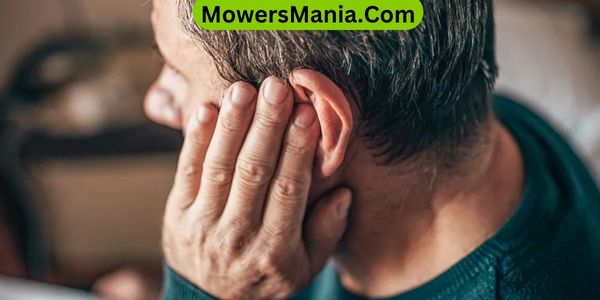Do you ever find yourself finishing up the lawn and then feeling discomfort in your ears?
It’s not uncommon to experience ear pain after mowing the lawn, but have you ever wondered why? There could be several factors contributing to this discomfort, and understanding them can help you find ways to prevent it.
Let’s explore the potential reasons behind your ear pain and what you can do to alleviate it.

Ear Protection Options
To protect your ears while mowing the lawn, consider wearing earplugs or earmuffs to reduce the risk of hearing damage.
Earplugs are a convenient and inexpensive option that can effectively reduce the noise level reaching your ears.
They come in disposable foam or reusable silicone varieties, allowing you to choose the best option for your comfort and budget. Inserting earplugs correctly is crucial for maximum effectiveness, so make sure to follow the instructions provided.
On the other hand, earmuffs provide a comfortable and easy-to-use alternative. They consist of ear cups connected by a headband, effectively covering your ears to block out the noise.
Earmuffs often come with adjustable headbands and cushioned ear cups for a secure and comfortable fit. Some models even incorporate additional features such as Bluetooth connectivity or built-in radio for entertainment while mowing.
Whichever option you choose, ensuring a proper fit is essential for optimal protection. Remember, protecting your ears while mowing can significantly reduce the risk of long-term hearing damage.
Impact of Loud Lawnmowers
Loud lawnmowers can cause significant damage to your hearing if not properly protected. The sound level of a typical gas-powered lawnmower can range from 90 to 100 decibels, which is well above the safe limit of 85 decibels for prolonged exposure.
Prolonged exposure to loud lawnmower noise can lead to permanent hearing damage, including tinnitus and gradual hearing loss.
The impact isn’t limited to just the person operating the lawnmower; bystanders are also at risk of hearing damage if they’re within close proximity to the machine.
The high noise levels produced by lawnmowers can lead to a range of health issues, including increased stress levels, elevated blood pressure, and disturbed sleep patterns.
Additionally, the noise pollution from loud lawnmowers can disrupt the peace and quiet of your neighborhood, causing annoyance to others.
It’s crucial to take the necessary precautions to protect your hearing when operating or being around loud lawnmowers.
Using ear protection such as earmuffs or earplugs can significantly reduce the risk of hearing damage and other associated health issues. Always prioritize your hearing health when dealing with loud lawnmowers.
Vibrations and Ear Discomfort

When mowing the lawn, the vibrations from the lawnmower can cause discomfort in your ears. As the lawnmower moves over the grass, it creates vibrations that travel through the handle and into your hands, arms, and ultimately, your head.
These vibrations can affect the delicate structures in your ears, leading to discomfort or pain. The vibrations may cause the tiny bones in your middle ear to move more than they should, which can be uncomfortable and potentially lead to temporary hearing issues.
The discomfort from the vibrations can be exacerbated by the prolonged exposure to the noise of the lawnmower.
The combination of loud noise and vibrations can put extra strain on your ears, making them more susceptible to discomfort and potential damage.
To minimize the impact of vibrations on your ears while mowing the lawn, consider using ear protection such as earmuffs or earplugs.
These can help reduce the transmission of vibrations to your inner ear and lessen the discomfort you may experience. Additionally, taking regular breaks during mowing to give your ears a rest can also help alleviate any discomfort caused by the vibrations.
Allergies and Ear Pain
If you suffer from allergies, you may experience ear pain that’s exacerbated by the act of mowing the lawn.
The connection between allergies and ear pain lies in the Eustachian tube, a small passageway that connects the upper part of the throat to the middle ear.
When allergies cause nasal congestion, the Eustachian tube can become blocked, leading to a feeling of fullness or pressure in the ears.
This can be further aggravated by the vibrations and loud noise of a lawnmower, intensifying the discomfort you may feel in your ears.
When allergies are at play, the sinuses can become inflamed, which can affect the Eustachian tube and lead to ear pain.
Additionally, the release of histamines during an allergic reaction can also cause the Eustachian tube to swell, further contributing to ear discomfort.
It’s important to manage your allergies to alleviate ear pain when mowing the lawn. Consult with a healthcare professional to develop a plan for managing your allergies, which may include medication, allergy shots, or lifestyle adjustments. Taking steps to reduce allergen exposure can also help alleviate the discomfort in your ears.
Prevention and Relief Tips

To prevent and alleviate ear pain when mowing the lawn, consider using ear protection such as earmuffs or earplugs.
These simple tools can significantly reduce the impact of the loud noise from the lawn mower on your ears. In addition to using ear protection, taking breaks during mowing can also help relieve the pressure and strain on your ears.
Remember to stay well-hydrated and take short breaks every 20-30 minutes to give your ears some rest.
| Prevention Tips | Relief Tips | Additional Advice |
|---|---|---|
| Use earmuffs or earplugs | Take breaks during mowing | Stay mindful of the noise level |
| Avoid prolonged exposure to loud noise | Stay well-hydrated | Consider hiring a professional for lawn care |
| Keep the lawn mower well-maintained | Practice ear exercises | Consult an ear specialist if pain persists |
Frequently Asked Questions [FAQs]
Can Ear Discomfort From Mowing the Lawn Be a Sign of a More Serious Underlying Condition?
Ear discomfort from mowing the lawn can be a sign of a more serious underlying condition, such as noise-induced hearing loss or ear infections. It’s important to protect your ears and seek medical advice if symptoms persist.
Are There Any Specific Types of Ear Protection That Are More Effective for Reducing Ear Discomfort While Mowing the Lawn?
When mowing the lawn, wearing earmuffs or earplugs can effectively reduce ear discomfort. Earmuffs with a noise reduction rating (NRR) of 24-28 dB or foam earplugs can provide substantial protection, ensuring a more comfortable experience.
Can Using a Different Type of Lawnmower or Lawn Care Equipment Help Reduce Ear Discomfort?
Using different lawnmower or lawn care equipment can help reduce ear discomfort. Consider using quieter electric or battery-powered mowers. Wear ear protection and take breaks to minimize exposure. Regular maintenance of equipment can also reduce noise levels.
Are There Any Specific Exercises or Stretches That Can Help Alleviate Ear Discomfort After Mowing the Lawn?
To alleviate ear discomfort after mowing, try gentle jaw exercises and neck stretches. These can help relieve tension in the muscles around your ears and may reduce the discomfort you experience. Remember to do them regularly for best results.
Can Certain Medications or Over-The-Counter Remedies Help Alleviate Ear Discomfort From Mowing the Lawn?
Certain medications or over-the-counter remedies can help alleviate ear discomfort after mowing the lawn. Consider consulting a healthcare professional to determine the best options for your specific situation and to ensure safe and effective relief.
Conclusion
So, next time you’re getting ready to mow the lawn, make sure to grab some ear protection and take breaks to give your ears a rest.
It’s also a good idea to keep an eye out for any signs of allergies that could be causing your ear pain.
By taking these simple steps, you can prevent and relieve any discomfort, so you can get back to enjoying your freshly cut lawn without any ear pain.



